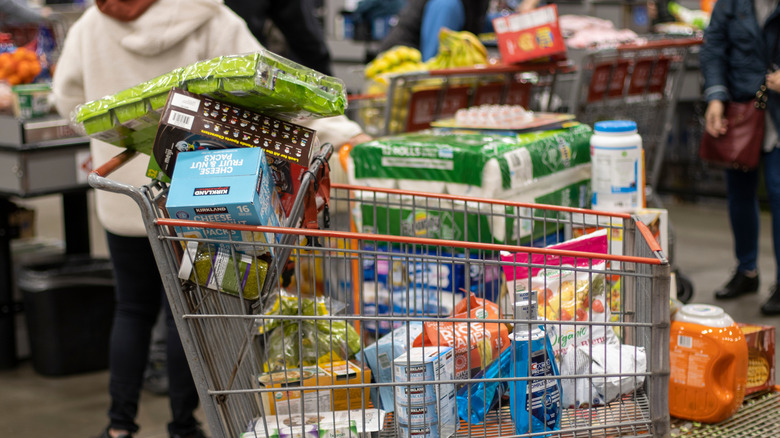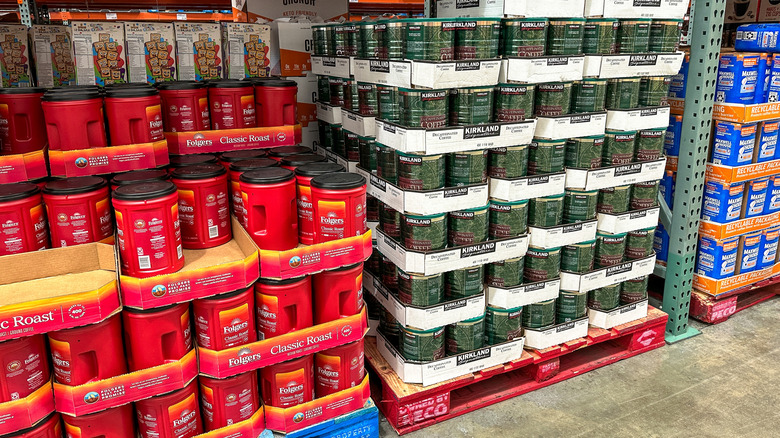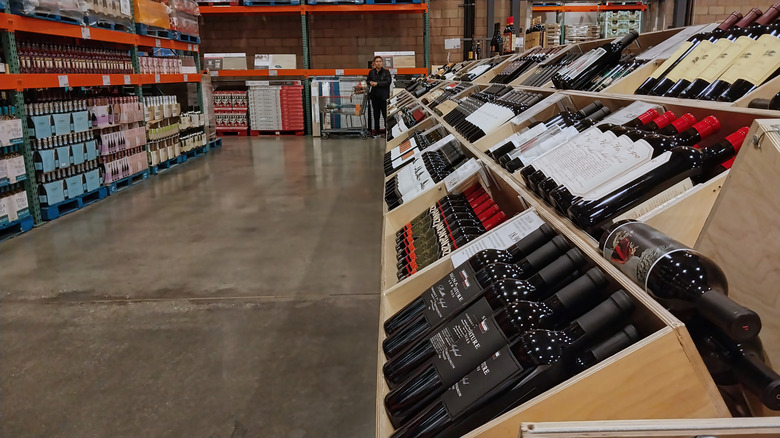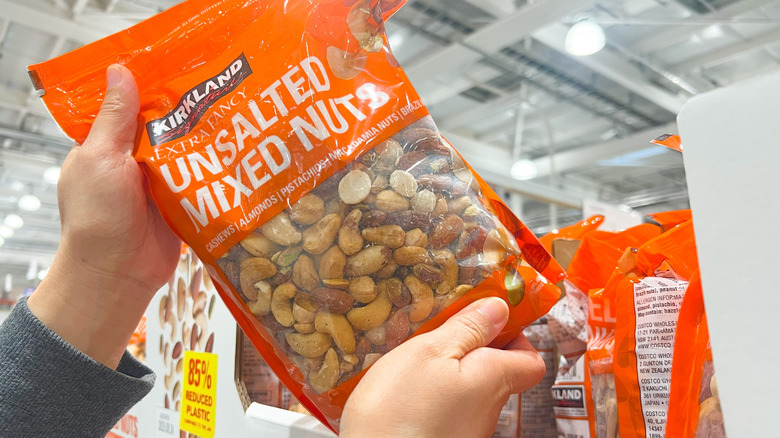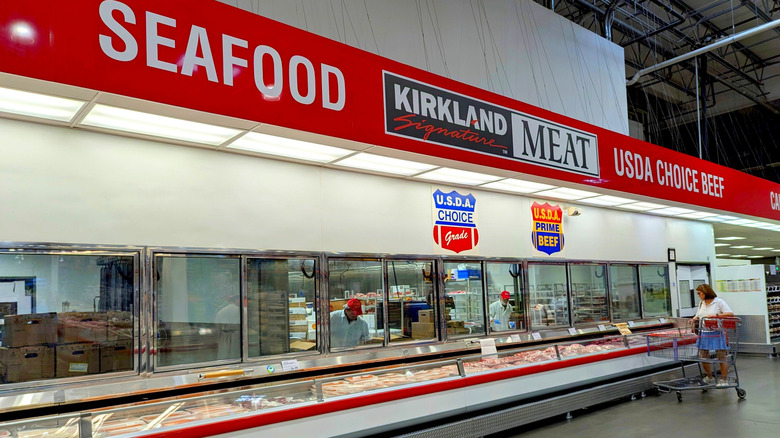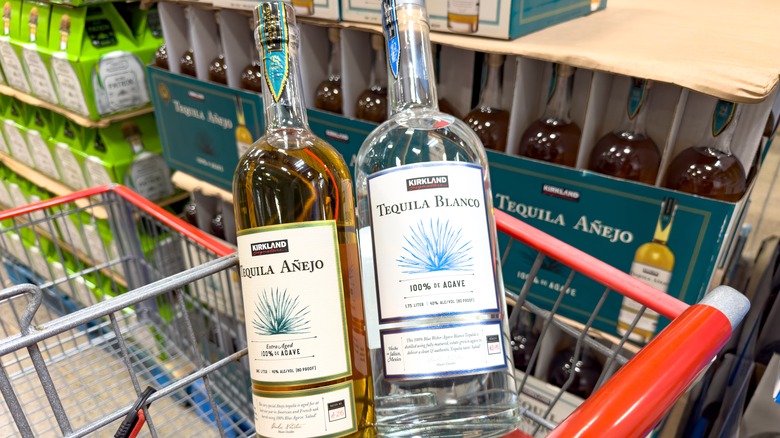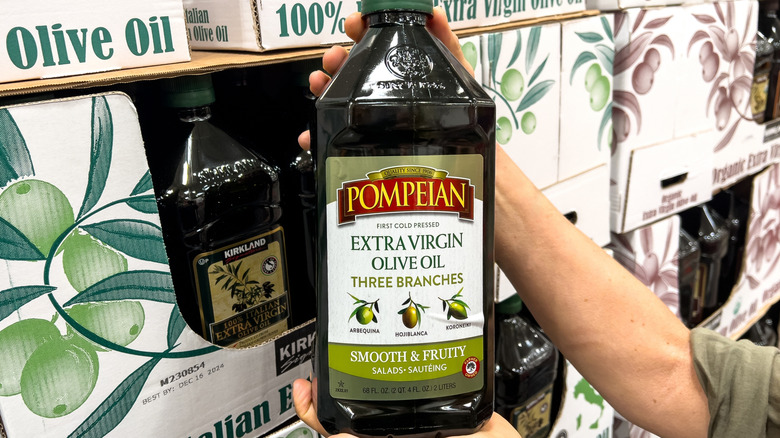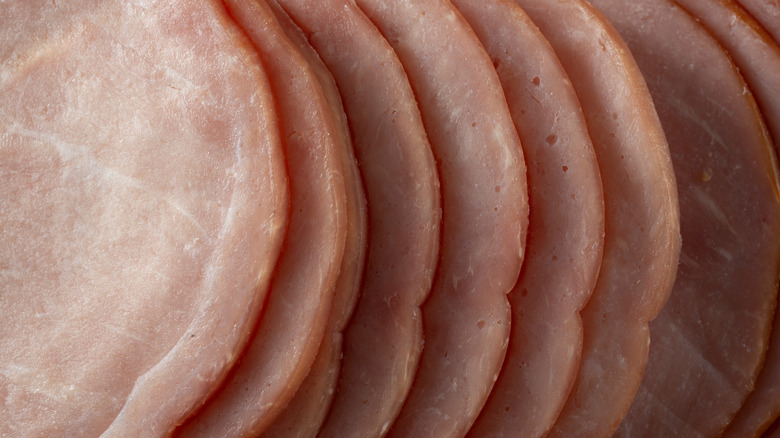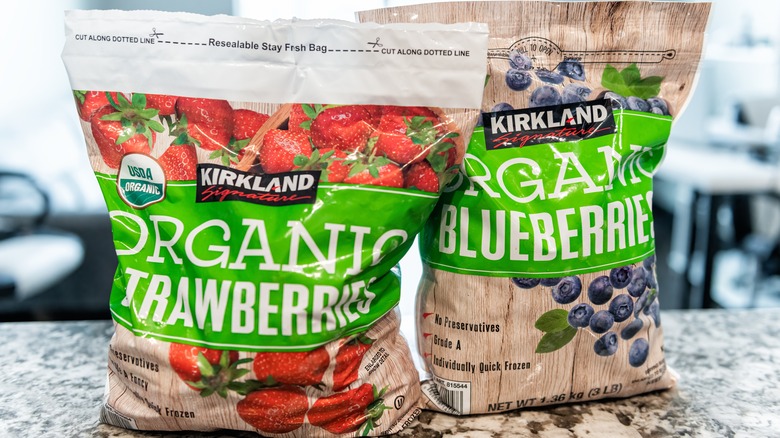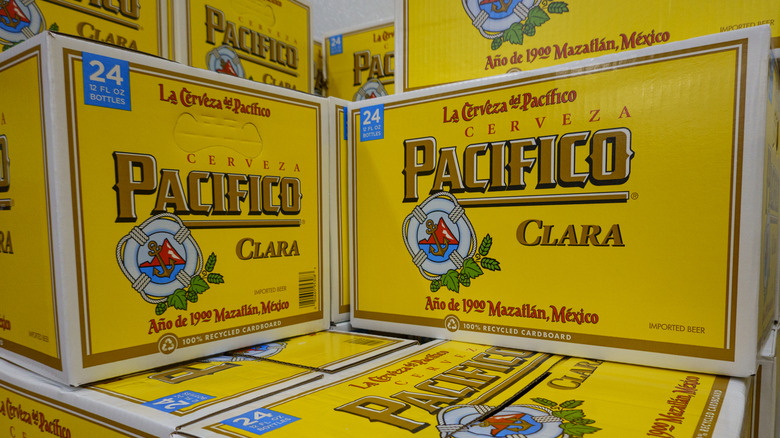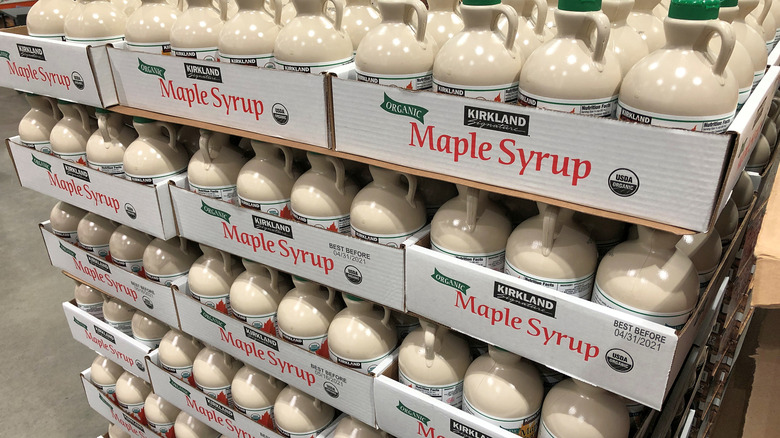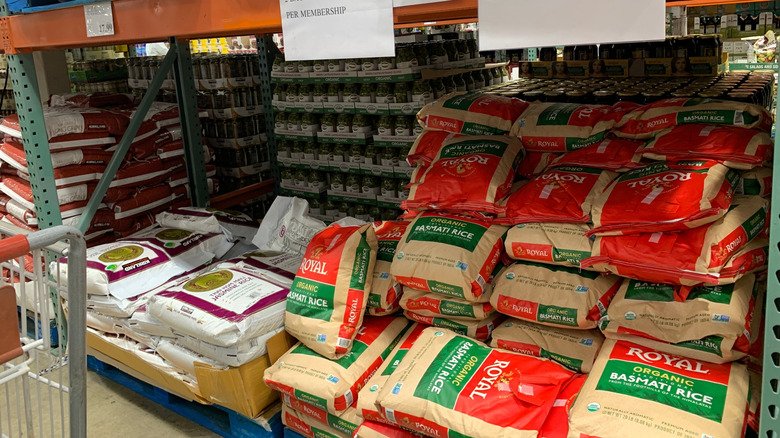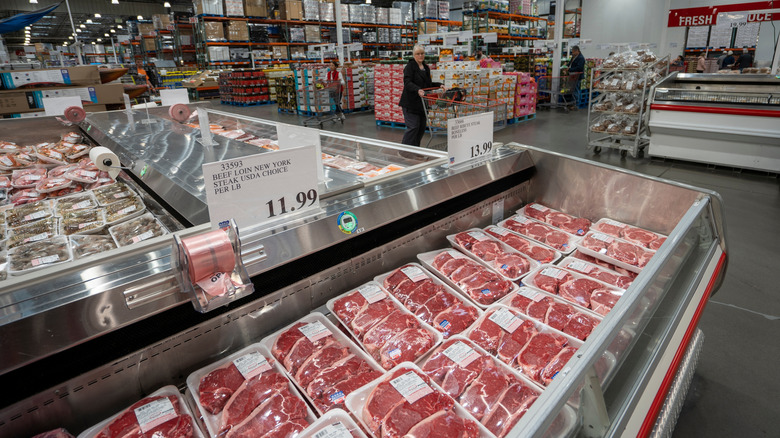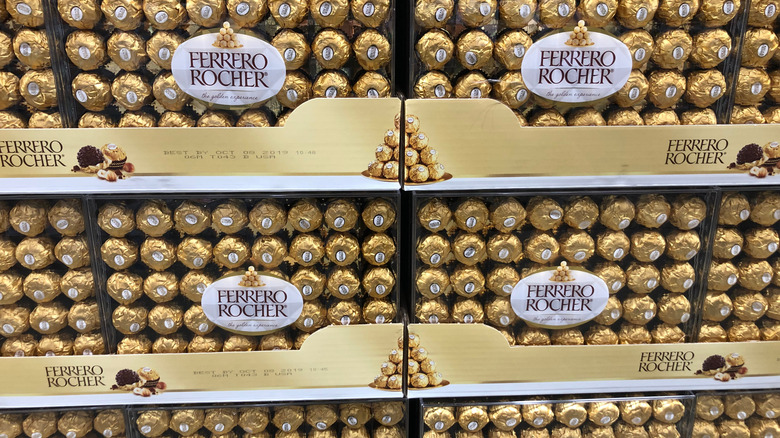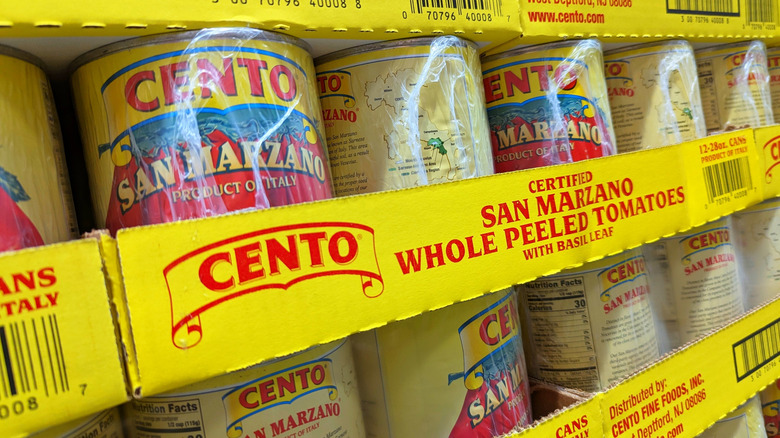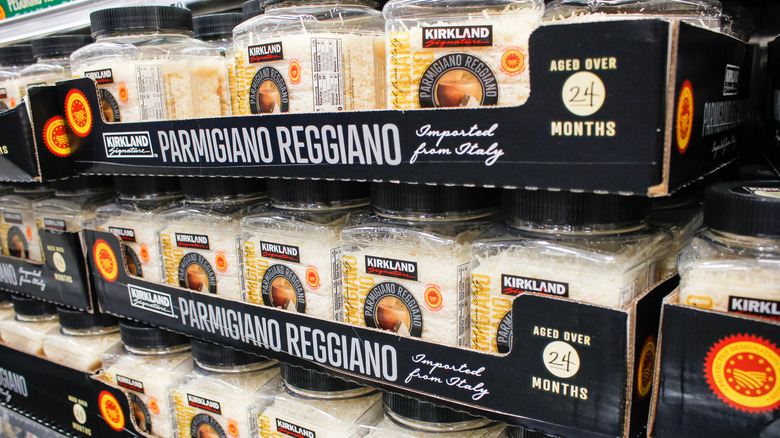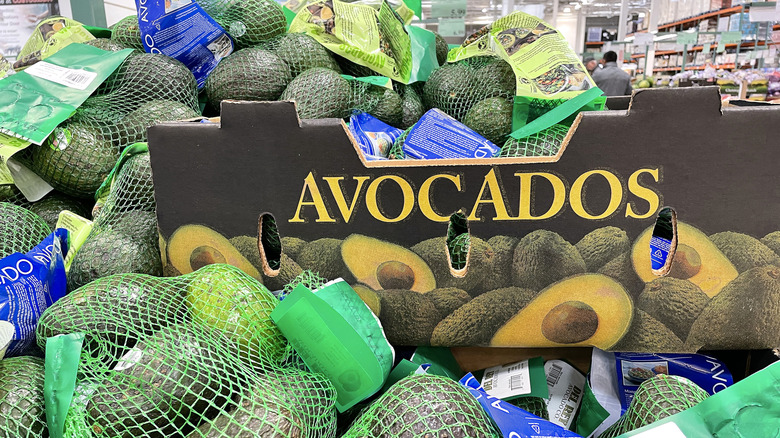16 Costco Foods To Buy Now Before Prices Skyrocket
President Trump has been toying with the idea of tariffs to bolster the economy. While the specific numbers are changing fast enough to make your head spin, most recently, he announced his new plan to impose a 10% minimum tariff on goods from all countries, plus reciprocal tariffs on certain countries. Some nations will be hit harder than others. For example, the European Union is expected to see 20% tariffs, and, of course, there's the impending deadline on the 90-day pause regarding Canada and Mexico. Still, regardless of how you feel about this plan to increase tariffs, one thing is for sure: Consumers can expect food prices to soar. Don't even get us started on shrinkflation, either.
With so many things up in the air, savvy shoppers are heading to the grocery store to get their favorite food items before prices skyrocket. One of the best places to accomplish this task is undoubtedly Costco. After all, it's got all your bulk food needs more than covered. Additionally, price increases are likely to hit smaller grocers first, so at least we have that going for us. Still, picking up a few essential foods from Costco before the ripple effect spreads will likely serve you and your wallet well. Just make sure you have plenty of freezer space before you stock up; you're going to need it.
Coffee
This one is going to make some people pretty upset — and far be it from us to interfere with your morning cup of coffee — but, sadly, coffee prices are going to soar due to new tariffs. Most of us know that coffee beans are generally imported, but we probably don't know the full extent. The U.S. The Department of Agriculture (USDA) reports that 80% of un-roasted coffee beans are imported from Latin America, specifically Brazil and Colombia. Okay, wow, so that means that most of our coffee beans will be subject to 10% tariffs. The remaining 20% of coffee beans could also suffer from tariffs, maybe even higher depending on the source.
If you don't want high prices to interfere with your love for coffee, your only option is to stock up. Fortunately, Costco sells super-sized canisters of coffee, so it won't be hard. Still, who knows how high coffee prices will rise before things level out? That is, of course, if they ever do.
Wine
For wine lovers, stocking up with a case or two of bottles is nothing new. However, even if that isn't typically how you shop, now's a good time to start, especially if you enjoy international wines — who doesn't? California and Washington wines are good and all, but there's a whole world of delectable grapes to know and sip.
According to the USDA, the top countries importing wine to the United States are Italy, France, New Zealand, and Spain. However, Argentina and Chile are also big suppliers. Regardless of the region you enjoy, all of these countries are facing increased tariffs. As part of the European Union, Italy, France, and Spain are poised to see 20% tariffs. The other top importing countries will face 10% tariffs. Do yourself a favor and stock up on your favorite wines from Costco before the pending changes cause wine prices to skyrocket. Fortunately, this is one item you can stockpile without worrying about spoilage.
Nuts
Thanks to tariffs, cooking and snacking on nuts is about to become way more expensive. If you have a nut allergy, no love lost, but the rest of us might want to stock up before prices go through the roof. NPR predicts that cashews, pecans, and macadamia nuts will see the most drastic price hikes, but price changes are unlikely to stop there.
Cashews, in particular, are poised to suffer a serious blow from tariffs. According to the World Bank, Vietnam, the Ivory Coast, Brazil, Thailand, and Nigeria are the top sources for imported cashews in the United States — and they are all facing steep tariffs. Vietnam is the worst with 46%, but Thailand trails close behind with 36%. After that is the Ivory Coast with 21%, Nigeria with 14%, and Brazil with 10%.
About 80% of the world's almonds are produced in California, so you might think they would be an exception to price increases. However, thanks to Canada being a major importer of fertilizers and its pending 25% tariffs, they are bound to be affected, as well.
Seafood
There are plenty of coastal cities and towns in the United States where you can get fresh-caught seafood. Heck, the whole state of Maine is known for lobster. Still, you might be surprised to learn that about 80% of seafood consumed in the United States is imported — and this includes both fresh and frozen products. Unfortunately, some of the largest countries to import seafood are getting clobbered with tariffs, so prices are bound to skyrocket soon.
According to the USDA, the main importers of seafood in the United States include Canada, Chile, India, Indonesia, and Vietnam. At 10%, Chile has the lowest tariffs of these countries. Next up is Canada with 25%, India with 26%, Indonesia with 32%, and a whopping 46% for Vietnam. So, yeah. It's not looking good for seafood. Fortunately, Costco has your back, but there's no guarantee for how long. Seafood lovers would be wise to fill their freezers while prices are still reasonable.
Tequila
Just like other products imported from Canada and Mexico, things aren't looking good for tequila and Canadian whisky. After all, there are strict guidelines about labeling spirits — you can't call it Canadian whisky if it doesn't come from Canada, and tequila must be produced in Mexico. What this means is both spirits will be battling tariffs. There has been some back and forth in the Trump administration about exactly how high tariffs for our neighbors to the North and South will be. For now, the number stands at 25%, which is relatively high compared to many other nations.
Plenty of spirits are made right here in the United States, and hopefully, their prices won't inflate along with the cost of imported goods. So, you can always opt for an American whiskey or bourbon, but there really isn't an alternative for all you tequila drinkers out there. Avoid the price gouging that's sure to ensue and grab a couple bottles of Canadian whisky and tequila from Costco the next time you're there.
Olive oil
Olive oil is a staple in many homes. In fact, plenty of people cook with it exclusively, so you probably won't like hearing this, but you can add it to the list of grocery items expected to see a hefty price increase resulting from President Trump's tariff changes. It's unfortunate, but it's true.
You could probably guess this, but most olive oil in the United States comes from the European Union — Italy and Spain, to be exact. Since both countries are part of the E.U., you guessed it, 20% tariffs. Some olive oil is produced right here at home, but not much. The New York Times reported that 97% of olive oil bought in the U.S. is imported. As if it wasn't already expensive enough, it's just going to get worse. Grab one of those large jugs of olive oil from Costco, and you may be able to soften the blow a bit. At least for a little while.
Canadian pork
With this food item, the name kind of says it all. After all, Canadian pork does, in fact, come from Canada. Aside from President Trump's self-proclaimed desire to make Canada the 51st state, something Canadians were extremely offended by, 25% tariffs are pending.
If you add the fact that Canada is one of the largest importers of pork in the United States, things are likely to get a bit messy. Obviously, strained relationships and retaliatory tariffs don't make a good recipe for amicable trade between the U.S. and Canada. With this in mind, there's no better time to stock up on Canadian pork than right now. Yes, there is plenty of American pork to go around, but there's a good chance prices will rise for it as well due to the need for imported goods along the production line.
Fruit
Many fruits Americans find on store shelves are grown right here in the United States, but not all of them. That's for sure, and the ones that we import will undoubtedly rise in price thanks to tariffs. Even the fruits that we grow right here at home will likely increase in price, and, yes, it's because of tariffs. While there aren't any import fees associated with the fruit itself, many fertilizers are imported from Canada, and the costs are bound to trickle down to consumers. Some of the fruit you should consider stocking up on first include bananas, mangoes, pineapples, melons, and plantains because they are largely imported from Costa Rica, Peru, and Guatemala — all countries subject to 10% tariffs.
According to CNN, prices on perishable food items are set to rise first. While you can't really stockpile fresh fruit, there's no better time to get your fill of it than now. If not, you may pay a hefty price for some of your favorite fruits in the very near future. You can stock up on frozen fruit, though. It's not quite the same, but frozen fruit is perfect for healthy smoothies and more, so go ahead and grab an extra bag the next time you are at Costco.
Beer
Beer is another beverage we should expect to be hit hard by new tariffs. Lots of the beers people enjoy every day are imported. Plus, even American canned beers are likely to spike in price due to import tariffs placed on countries like China because they produce the aluminum needed to make cans. Really, no beer is safe, and some products could even be subject to more than one tariff as a result.
In addition to canned American beers, imported beers won't fare well. The biggest importers of beer in the United States include Mexico, the Netherlands, Ireland, and Canada. As we know, both Canada and Mexico are facing 25% tariffs, and the European Union 20%. With this in mind, anyone who loves a refreshing Corona, Modelo, Guinness, Molson, or Heineken should take this tip to heart and fill a cart with them the next time they visit Costco. If not, those summer beers might just leave a bad taste in your mouth and an oversized dent in your wallet.
Maple syrup
According to the World Bank, the top importer of maple syrup and maple sugar was none other than the United States, and we took the lead by a large margin. Pair that with the fact that Canada produces 71% of the world's pure maple syrup, and we're sure you can see where this going. Yup, those 25% tariffs will result in a serious maple syrup price hike. If you love a good plate of pancakes or waffles for breakfast, or any time of day, for that matter, picking up a bulk-sized jar of it from Costco sooner rather than later could save you some hard-earned cash.
New England definitely pumps out tasty maple syrup (here's looking at you, Vermont, Maine, and New York), so you might be able to redirect your spending with this particular food product, but the domestic stuff isn't cheap, either. Plus, you never know what kinds of supplies American maple syrup producers import to help them get the job done.
Rice
Rice is not only a staple food for many cultures around the world, but it is also one of the cheapest foods on the planet. However, the low prices we are accustomed to are likely fleeting. Will rice become super expensive? Probably not, but a price increase is expected nonetheless.
Most of the rice Americans eat is produced right here in the United States. Even so, tariffs will likely affect costs because fertilizers and other goods needed for production are often imported. In addition, the USDA reports that more than 25% of the rice sold in the U.S. is imported. For the most part, we source aromatic rice, like Jasmine from Thailand and basmati from India. We also source some long-grain milled rice from South America. The 36% tariffs on Thailand and 26% tariffs on India will put a wrench in things, and it is safe to assume prices will rise. The 10% tariffs on South America won't help, either.
Beef
Beef is another food product that'll experience rising costs due to tariffs. Admittedly, 90% of the beef bought and sold in the United States is domestic. However, beef prices are already pretty high. Add to that the fact that the U.S. cattle herd is at historical lows, and our country's dependency on imported beef is sure to grow.
According to the USDA, Canada, Mexico, Brazil, Australia, and New Zealand are the top importers of beef in the United States. Canada and Mexico are facing 25% tariffs, and Brazil, Australia, and New Zealand are up against 10% tariffs. While companies are responsible for paying the import fees, the increase in costs will undoubtedly be passed down to us, the consumers. Fortunately, Costco is the best store to buy meat from because it offers shoppers the perfect blend of quantity and quality. However, with tariffs looming, the time to buy is now. Save yourself some cash and stock your freezer as soon as possible.
Chocolate
Candy lovers beware: The price for chocolate and candy bars could easily get out of hand due to the new tariffs proposed by the Trump administration. Obviously, this will affect imported chocolates, like Ferrero Rocher, but American companies are going to suffer as well because they import the cocoa beans needed to make their candies. The top sources for cocoa beans include the Ivory Coast, which will see 21% tariffs, and Ecuador, which is expected to experience 10% tariffs. Hershey, one of the most beloved American chocolate companies, sources its cocoa from both countries.
Candy bars, in particular, are going to get hit hard by new tariffs. Not only is the price of chocolate expected to rise, but the metal wrappers candy bars come in will be subject to tariffs as well. Additionally, the tariffs placed on wrappers could be astronomical. For example, if they come from China, the rate will likely be 145%. Yikes! Before things get out of hand, stock up on chocolate and candy bars at Costco. Your sweet tooth and your wallet will thank you.
Tomatoes
Tomatoes aren't one of the first fruits to come to mind, probably because we cook them much like vegetables. Still, tomatoes are one more food item you'd be wise to stock up on now before prices soar. Why? Well, as it turns out, Mexico is the top supplier of fresh tomatoes to the United States. According to the World Bank, if you exclude tomatoes used in sauces, 70% of the fresh tomatoes we buy come from Mexico. As we know, Mexico is expected to see 25% tariffs, so, yeah, tomatoes are on the chopping block.
In addition to fresh tomatoes, some of the best canned tomatoes are imported from Italy. As part of the European Union, Italy is poised to experience 20% tariffs. However, thanks to the long shelf life of canned goods, this is one fruit you can actually stock up on without having to worry about spoilage. You don't even need any space in your freezer.
Cheese
Americans love cheese, and we export quite a bit of it. However, we also love cheeses from all over the world, which, of course, must be imported. The number one importer of cheese in the United States is Italy, so that means the price of our beloved mozzarella, Parmesan, provolone, fontina, and more is prime to spike. We can expect the same for French cheeses like brie and Camembert, and Spanish cheeses such as Manchego. That just scratches the surface of imported cheese, too. Regardless, the European Union is home to the main U.S. cheese importers, and those 20% tariffs are sure to affect the cheese market.
Stocking up on cheese isn't really feasible, because it has a short shelf life. That's okay, though. You can grab some of your imported favorites to enjoy before prices go up, and grab a large bottle or two of shelf-stable Parmesan cheese, as well. That should hold you over for quite some time. When you reach the bottom of one of the huge bottles of Parmesan cheese Costco sells, you can always reuse it for something else in the kitchen, too. Since we're talking about savings, it only seems fitting.
Avocados
Technically, avocados are a fruit, but we don't always think of them as such. Regardless of their classification, avocados deserve to be called out all by themselves. Even without tariffs, avocados are quite expensive, but there's no other food like them, and most people are willing to pay top dollar. That is, of course, until the price for avocados rises again thanks to tariffs. It's bound to happen, too, because 90% of the avocados we eat in the United States are imported from Mexico. With 25% tariffs in store for the country, it's not looking good for our avocado supply.
The next time you are at Costco, grabbing a large bag of fresh avocados would be a smart move. They won't last you until prices start falling (if they ever do), but at least you can relish in one last bag before your wallet takes a hit. Costco also sells frozen avocado chunks (perfect for tossing into a smoothie). Grabbing a bag or two of them isn't a bad idea, either.

